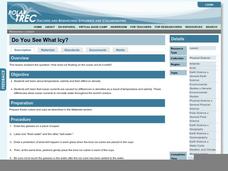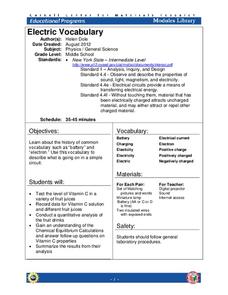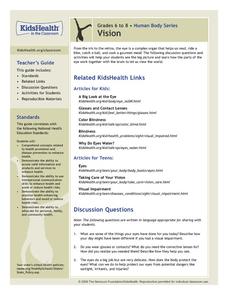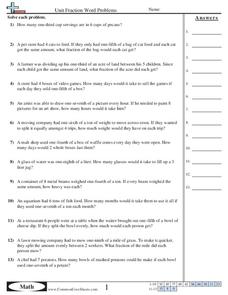American Chemical Society
Changing State: Condensation
When you have a cold drink and you notice the water forming on the outside, it is literally pulling the water from the surrounding air to form the condensation. After watching a demonstration of condensation forming on a glass,...
Curated OER
What Can We Learn From the Past?
What would future archeologists learn from your scholars' personal belongings? Have them bring in a box of "primary sources" from their home. Discuss the difference between observations and inference, using some of your own items to...
Curated OER
Hot, Hot, Hot, Cold
Learners dance the image of falling snow. They move, swing, fall, and rise to music working to depict snow falling, the sun, and high/low movements. This is a well-thought out lesson that aids them in seeing movement as a form of...
Captain Planet Foundation
Rotting Away
What happens at the end of a plant's life cycle? Show kids the natural way that plants show that they're decomposing, as well as the importance of compost, with a activity about living organisms. After reading Log Cabin by Anne...
Teach Engineering
Microfluidic Devices and Flow Rate
When you have to flow, you have to flow. The lesson introduces class members to microfluidic devices and their uses in medicine. They watch a short video on how the diameter affects the rate of flow. The worksheet has individuals...
101 Questions
Meatballs
Your classroom will overflow with learning as they analyze the volume in a pot of meatballs. Young mathematicians predict the number of meatballs that will make a pot of sauce overflow. They incorporate both the volume of cylinders and...
Equality and Human Rights Commission
Learning area 1: Who am I?
Five activities encourage scholars to dream big and celebrate the similarities and differences of those around them. Learners take part in two active practices that showcase how their peers are the same and different. Worksheets...
Curated OER
Density of Glass Fragments
Young scholars explore how the density of an object is determined and determine what a "physical property" is. They demonstrate how science can be applied to police work.
Calvin Crest Outdoor School
Survival
Equip young campers with important survival knowledge with a set of engaging lessons. Teammates work together to complete three outdoor activities, which include building a shelter, starting a campfire, and finding directions in the...
Polar Trec
Do You See What Icy?
Here is a lesson that kicks off with a question. "How does ice floating on the ocean act as it melts?" As learners investigate this natural phenomenon, they'll discover that it has a lot to do with temperature, salinity, and the effect...
Nuffield Foundation
Going up in Smoke
Don't let all your hard work go up in smoke. Pupils conduct an experiment to see the harmful effects of cigarette smoke. They observe how smoke changes the color of white wool and an indicator solution.
Curated OER
Close Observation: Coins
Integrate math, science, and speaking/listening with a collaborative hands-on activity. Each group works with a single penny, examining it with the naked eye and recording observations. Repeat using magnifying glasses. Then repeat with a...
K12 Reader
What Causes Reflections?
Your kids probably use mirrors every day, but do they know how they work? A reading passage about reflection and reflective objects can address both physical science and reading comprehension. Kids read the paragraphs and use context...
Exploratorium
The Dipping Bird
If you have or want to order the dipping bird demonstration, it is useful for showing how evaporation and changes in the pressure of a closed system cause cyclical motion. After teaching about pressure, consider setting this little guy...
US Environmental Protection Agency
Water Purification by Evaporation and Condensation
This easy-to-perform demonstration shows students how the water cycle, specifically the processes of condensation and evaporation, purifies Earth's water supply. Just mix up some water, dirt, and gravel in a glass bowl, place a cup in...
Teach Engineering
Exploring Capillary Action
Explore capillary action from different perspectives. In the fourth installment of a nine-part series, scholars perform several experiments to observe capillary action. They look at the meniscus of water in a glass, observe capillary...
Cornell University
Electric Vocabulary
Practice electric vocabulary using multiple methods. Learners begin by watching a video that explains vocabulary related to electric currents. They match vocabulary cards to practice and then create an electric circuit. Using the...
Curated OER
# 02 The Aspirin Shelf-Life Scenario
Students work for a company that produces acetylaslicylic acid, aspirin. They have been assigned the task of determining if different packaging materials and/or environmental storage procedures can increase the shelf-life of the product.
Curated OER
Recycling: Responsible Behaviors
Take the time to teach learners with moderate disabilities how to identify recyclable materials. They learn how to recycle as a mode of social responsibility and community involvement. They practice identifying and sorting recyclable...
Nemours KidsHealth
Vision
From the iris and retina to glasses and contact lenses, learners will be excited to see what activities are in store for them as they learn about the complex organ of the human eye.
California Academy of Science
Notice and Wonder
Pint-sized zoologists practice the art of observation. They take notes, pictures or written, as they observe an animal for a period of time. This can be done at the zoo, with a visiting classroom animal, or perhaps at the humane society....
Common Core Sheets
Unit Fraction Word Problems
A set of worksheets prompts learners to practice solving fraction-based word problems. Each problem involves the division of whole numbers by unit fractions. As they work, mathematicians begin to see how division relates to...
NOAA
Build Your Own Ocean Ecosystem
Hold the sea in the palm of your hand! Amateur oceanographers work together to create models of an ocean ecosystem in the sixth and final installment in a series. Raise awareness of global ocean health issues through guided research,...
Nuffield Foundation
Observing Earthworm Locomotion
One acre of land can contain more than a million earthworms. Scholars collect earthworms to observe their movements. Once placed on paper, the sound of movement often fascinates pupils. When placed on glass, the earthworm is unable to...

























